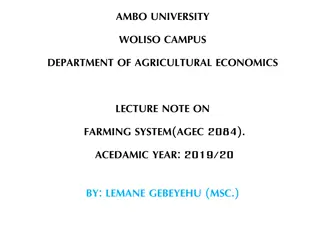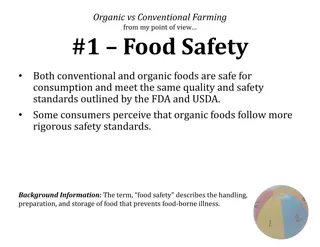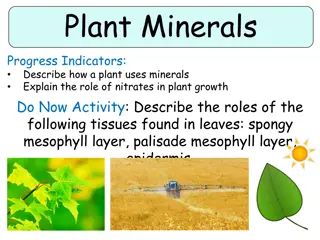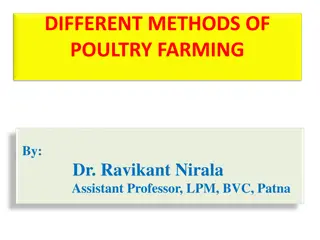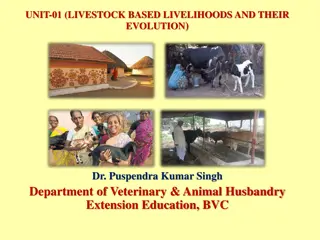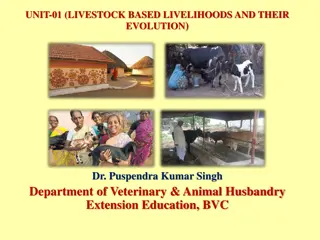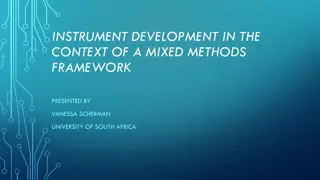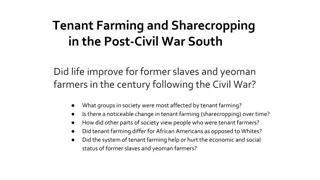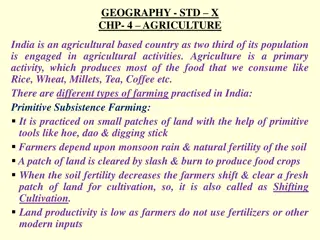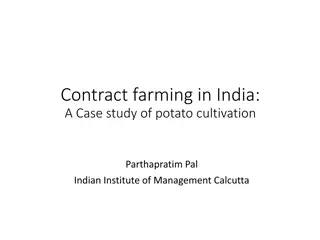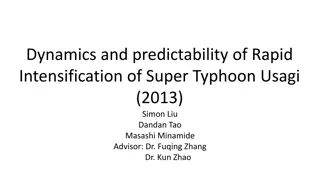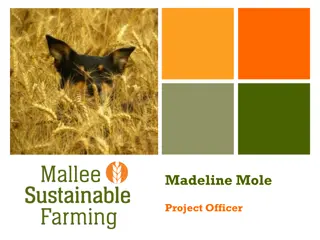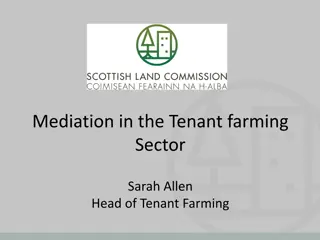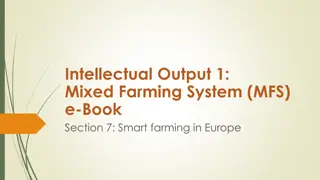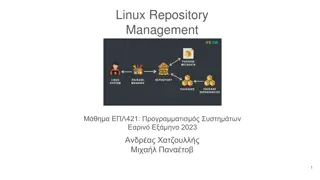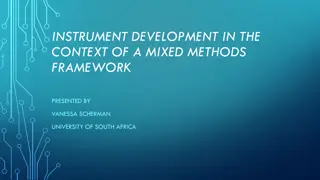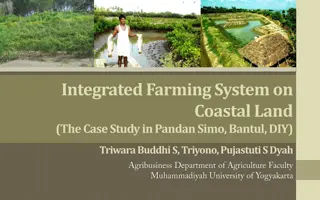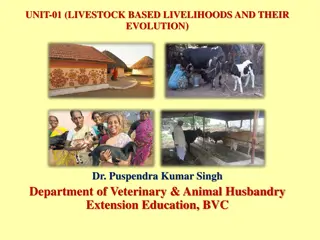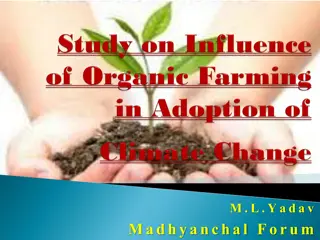Sustainable Intensification of Mixed Farming Systems: Work Package 3 Overview and Objectives
This document provides an overview of Work Package 3 focusing on participatory design, implementation, and monitoring of approaches for sustainable intensification of mixed farming systems (SI-MFS). The objectives include assessing demand, refining SI options, generating evidence for adoption, and identifying scalable innovation packages. Research questions explore opportunities, constraints, and preferred entry points for improving equity, resilience, and efficiency along SI pathways. Activities involve data collection tools preparation, development of valid indicators, and MFS typologies. Partners from various countries are involved in these activities to promote sustainable agricultural practices.
Download Presentation

Please find below an Image/Link to download the presentation.
The content on the website is provided AS IS for your information and personal use only. It may not be sold, licensed, or shared on other websites without obtaining consent from the author.If you encounter any issues during the download, it is possible that the publisher has removed the file from their server.
You are allowed to download the files provided on this website for personal or commercial use, subject to the condition that they are used lawfully. All files are the property of their respective owners.
The content on the website is provided AS IS for your information and personal use only. It may not be sold, licensed, or shared on other websites without obtaining consent from the author.
E N D
Presentation Transcript
Sustainable Intensification of Mixed Farming Systems: Work Package 3 Overview Aymen Frija International Center for Agriculture Research in the Dry Areas (ICARDA) Initiative Planning and Inception Meeting 31 May 2 June 2022, ILRI Campus, Addis Ababa, Ethiopia.
WP overview, objectives and research questions To focus on participatory design, implementation, critical reflection, and monitoring of approaches and interventions for SI-MFS, 01 Assesses demand and refine SI options through data from a network of pilot areas, 02 Generate strong evidence that promotes adoption and highlights aspects contributing to update of SI options for MFS 03 www.cgiar.org
Research questions 01 What are the opportunities, constraints, and preferred entry points for improving equity, resilience, and efficiency along SI pathways? (co-diagnosis) Which features of socio-technical innovation packages for SI of MFS enhance uptake and improve sustainability, resilience and equity of MFS? (Participatory Bundling in Selected Farming Systems) 02 Which are the most scalable SI innovation packages that improve sustainability, resilience, and equity in the selected MFS? (Co- evaluation) 03 www.cgiar.org
Work Package 3 outputs, activities and deliverables Output Activity Entity and Partners System/Country 2022 Deliverables Output 3.1 Preparation of data collection tools (questionnaire / ODKs) and support for baseline characterization All involved CG centers Nepal, Ethiopia, Bangladesh, Laos, Malawi, Ghana 1. Sex-disaggregated open access datasets generated from pilot areas ready for internal and external use; Sex-disaggregated open access datasets generated from pilot areas ready for use by WP2, WP4, and WP5 and other initiatives and partners. Sampling and actual data collection in collaboration with national partners All involved CG centers Nepal, Ethiopia, Bangladesh, Laos, Malawi, Ghana Data curation and publication All involved CG centers Nepal, Ethiopia, Bangladesh, Laos, Malawi, Ghana www.cgiar.org
Work Package 3 outputs, activities and deliverables Output Activity Entity and Partners System/Country 2022 Deliverables Output 3.1 Development and validation of a set of valid indicators for typology and identification scope for SI of MFS All involved CG centers Nepal, Ethiopia, Bangladesh, Laos, Malawi, Ghana 2. MFS typologies and characterization of selected MFS for e-Atlas Atlas of MFS typology and characterization of selected farming systems in terms of their potential for SI with a specific focus on resilience, efficiency and equity and farmers preferences clustering and data analysis and generation of appropriate SI-MFS typologies in the considered countries (systems) All involved CG centers Nepal, Ethiopia, Bangladesh, Laos, Malawi, Ghana GIS analysis for the studied MFS types for enhanced characterization beyond the studied sites/countries, All involved CG centers Nepal, Ethiopia, Bangladesh, Laos, Malawi, Ghana www.cgiar.org
Work Package 3 outputs, activities and deliverables Output Activity Entity and Partners System/Country 2022 Deliverables Output 3.3 Develop scaling strategies for the identified innovative packages, (together with SR) All involved CG centers Nepal, Ethiopia, Bangladesh, Laos, Malawi, Ghana 3. Technical reports with suite of validated, context-specific SI innovation packages ready for scaling Technical papers providing suite of Co-refined and validated context-specific, technically and economically viable, gender-transformative and demand-driven innovation packages co-refining, validation, and testing of the developed innovation packages All involved CG centers Nepal, Ethiopia, Bangladesh, Laos, Malawi, Ghana Multicriteria assessment of the tested/piloted innovation packages, with documentation of the most impactful ones All involved CG centers Nepal, Ethiopia, Bangladesh, Laos, Malawi, Ghana www.cgiar.org
Implementation dynamics Missing information on implementation partners, Potential innovations not yet discussed in depth, www.cgiar.org
Implementation dynamics Technical Innovations specific to different farming systems Contour bunding technology (CBT) Climate Smart strip intercropping in maize systems The doubled-up legume technology Innovative crop sequencing for productivity Improved forages for sustainable intensification of MFS Catalogue of multipurpose crops and trees combinations Integrated Livestock Feed Intensification Rice-Sunflower system to improve nutritional outcome Cereal-forage system to boost livestock Rice-agroforestry system to reduce environmental footprint Collective leadership for sustainable and equitable MFS Scaling Water-centric MFS for prosperity and empowerment Scaling Agricultural Mechanization through Group Business Model Game changer for digital transformation of agriculture (MWANGA) www.cgiar.org
Implementation dynamics Other types of innovations www.cgiar.org
Linkages with other work package and cross-cutting themes WP3 provides empirical settings, demand specifications, and data to develop/adapt and apply M&T from WP2 WP3 will provides local co-design examples and empirical evidence on SI options for global and regional analyses in WP1 With support from WP4, WP3 will generate evidence on enabling environments for scaling and will support the related capacity development (WP5) www.cgiar.org
Linkages with other work package and cross-cutting themes www.cgiar.org
Potential linkages with other initiatives WP3 will engage in pilot sites where other Initiatives are operating (e.g., Foresight & Metrics, EiA, SAPLING, Agroecology). 1. With SAPLING: Nepal, Ethiopia, 2. With Agroecology: Laos, Burkina, 3. With Foresight and metric /LCSR: Series of global outlook studies (livestock and MFS can be one) www.cgiar.org
Key messages from Pre-inception meetings Data collection under WP 3 need to be discussed with MELIA (to avoid redundancies) and WP2 who will be the main users of our datasets. Other issues related to the best way of collecting qualitative data was also discussed, Urgent need to discuss the priorities for the implementation: what are the priorities? Seasons which will start shortly? Packaging of innovations, which is key concept for this initiative? Etc. Site selection is still not clear yet in all countries. Which participatory platforms/approaches are we going to adopt in each country, and how much space country leaders need to have in this regards (vs centralized approaches for cross-countries comparison)? What will be the scope of the piloting, what and how much trials and demonstrations? Knowing that it s always difficult to pilot system packages! www.cgiar.org


